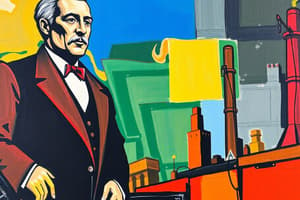Podcast
Questions and Answers
Which industry did Cornelius Vanderbilt primarily use to accumulate his wealth?
Which industry did Cornelius Vanderbilt primarily use to accumulate his wealth?
- Steel
- Banking
- Railroad and Shipping (correct)
- Oil
Andrew Carnegie believed it was better to leave a large inheritance to family than to give money away during his lifetime.
Andrew Carnegie believed it was better to leave a large inheritance to family than to give money away during his lifetime.
False (B)
What was a primary cause many people had for disliking the wealthy men of the Gilded Age, in regards to business practices?
What was a primary cause many people had for disliking the wealthy men of the Gilded Age, in regards to business practices?
selfish purposes and exploitation of workers / exploitation of workers / not paying employees enough
During his lifetime, Andrew Carnegie helped fund more than 2,500 ______.
During his lifetime, Andrew Carnegie helped fund more than 2,500 ______.
Match the following philanthropists with their primary focus of charitable giving:
Match the following philanthropists with their primary focus of charitable giving:
What is a key characteristic of a capitalist system, as described?
What is a key characteristic of a capitalist system, as described?
The text suggests that under a system of capitalism, wealth is always distributed evenly among the population.
The text suggests that under a system of capitalism, wealth is always distributed evenly among the population.
What potential negative impact does the text suggest wealth can have on individuals?
What potential negative impact does the text suggest wealth can have on individuals?
What is one thing God expects from all people, regardless of their wealth?
What is one thing God expects from all people, regardless of their wealth?
Many 'Rags-to-Riches' stories became popular in the late 1800s because some Americans thought they could achieve fabulous riches if they only worked hard enough and used money ______.
Many 'Rags-to-Riches' stories became popular in the late 1800s because some Americans thought they could achieve fabulous riches if they only worked hard enough and used money ______.
Flashcards
Men of Means
Men of Means
Wealthy industrialists of the late 1800s who amassed fortunes in industries like steel, oil, and railroads.
Business Acumen
Business Acumen
The ability to identify lucrative opportunities and make profitable decisions in business and investments.
Philanthropy
Philanthropy
The practice of donating large sums of money to charitable causes.
Capitalism
Capitalism
Signup and view all the flashcards
"Rags-to-Riches"
"Rags-to-Riches"
Signup and view all the flashcards
Coveting Wealth
Coveting Wealth
Signup and view all the flashcards
Contentment
Contentment
Signup and view all the flashcards
Generosity
Generosity
Signup and view all the flashcards
Wealth Obsession
Wealth Obsession
Signup and view all the flashcards
Study Notes
- In the late 1800s, some Americans accumulated unprecedented wealth.
- Andrew Carnegie made his fortune in the steel industry.
- John D. Rockefeller became wealthy in the oil industry.
- Cornelius Vanderbilt gained riches through railroads and shipping.
- These men were worth millions of dollars.
- Many wealthy men of the Gilded Age were not born rich.
- These men learned to work hard, earn money, and invest wisely.
- They understood how to save and when to take financial risks.
- The men were adept at recognizing profitable opportunities.
Philanthropy
- Wealthy men gave away significant portions of their wealth.
- Andrew Carnegie advocated for using wealth to help others during one's lifetime.
- Carnegie contributed to the construction of over 2,500 libraries.
- He also donated to schools, colleges, and churches.
- Carnegie gave away over $350 million by the time of his death.
- John D. Rockefeller was taught to give money away early in life.
- Rockefeller donated millions to medical research and schools.
- Other wealthy men also gave generously to churches, hospitals, museums, and opera houses.
Public Opinion
- "Rags-to-riches" stories became popular, inspiring some to pursue wealth.
- Some believed hard work and wise money management could lead to riches.
- Others viewed the millionaires negatively.
- Critics felt they possessed excessive wealth and questioned their business practices.
- Some accused them of exploiting others for selfish gain.
- Some thought they demanded too much from their workers while paying them too little.
Capitalism
- Americans were gaining experience with capitalism.
- Capitalism is a system where people, not the government, own goods and businesses.
- Everyone is free to earn, spend, start businesses, and invest.
- Capitalism leads to disparities in wealth.
- Those with less money may envy the wealthy.
- The wealthy may look down on the poor.
- Wealth can cause people to forget generosity and thankfulness to God.
- God expects everyone to work hard, trust Him, be content, and use their resources for good.
Studying That Suits You
Use AI to generate personalized quizzes and flashcards to suit your learning preferences.




